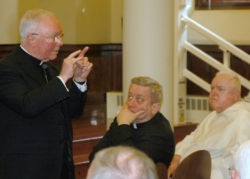Cardinal Stafford speaks at St. John’s Seminary
BRIGHTON -- Cardinal J. Francis Stafford, head of the Apostolic Penitentiary, spoke to laity, priests and seminarians on the nature of penance and reconciliation between the Catholic Church and her people in addresses sponsored by St. John’s Seminary in Brighton on Feb. 3 and 5.
The Apostolic Penitentiary is a Vatican court dealing with matters of conscience.
The program was an opportunity to share Cardinal Stafford’s knowledge with as many people as possible, said Bishop John A. Dooher, who attended the Feb. 5 session held for priests.
“It is part of the archdiocese’s effort to reach out and support the work of priests,” he said. “We have priests here from as far as Bar Harbor, Maine, Fall River and all over New England.”
Cardinal Stafford’s career began first as a priest then as auxiliary bishop, with more than 20 years working to solve urban strife and suffering in Baltimore, said Father John A. Farren, OP, the rector of St. John’s. “Then he went on to become the bishop of Memphis, where he had to deal with Elvis Presley and the consequences of all that,” Father Farren joked.
After Memphis, the cardinal was the archbishop of Denver from 1986 to 1996 and served in Rome from 1996 to 2003 as the president of the Pontifical Council for the Laity.
Now heading the Apostolic Penitentiary, he continues to confront issues of conflict, tension and sin. The office adjudicates cases of conscience, indulgences and the absolution of excommunications, he said.
In his remarks to the laity, Cardinal Stafford said they must step up to form a nurturing society within the Church that takes the spirit of reconciliation beyond the physical rite.
The cardinal added that one year in Denver more than 2,000 candidates attended Mass the first Sunday of Lent for the Rite of Christian Initiation of Adults. When they were invited back for Pentecost, only a few hundred came back.
“That tells me: We can get them, but we can’t keep them,” he said.
The falloff in Mass attendance speaks to our failure to fully integrate our laity into a rich parish life. Other churches do a better job of integrating their members, he said.
As the bishop of Memphis, Cardinal Stafford would attend Southern Baptist services and gatherings in plain clothes to learn how they built their communities. He saw that one of the keys was a wider expression of reconciliation among the laity, he said.
The cardinal said he witnessed one example of a husband and father, who confessed to his congregation he was tempted by adultery during his extended business trips.
It was painful for the man, but more painful to the wife, who was there also. But, that community was strong enough to support the husband as he battled his temptations. It was, more importantly, strong enough to support the wife, who was humiliated by her husband’s public confession, he said.
Priests should embrace and encourage the laity as they build up social networks capable of spreading reconciliation, he said.
“They are the new prophets of our time -- I really mean that, and you can take it for what it is worth,” he added.
Because of his position in the Church, Cardinal Stafford said it was important for him to come to Boston in the wake of the scandal of sexual abuse by priests.
He said he was struck by a homily he heard the previous day in which a priest told his parishioners, regarding life after the scandal: “If forgiveness is not part of the process, I don’t want anything to do with it.”
The priest was right, he said. There has to be forgiveness, but first there must be tears.
“Tears of sorrow, tears of anger and finally tears of joy as we realize that God is calling us together again,” he said.



















